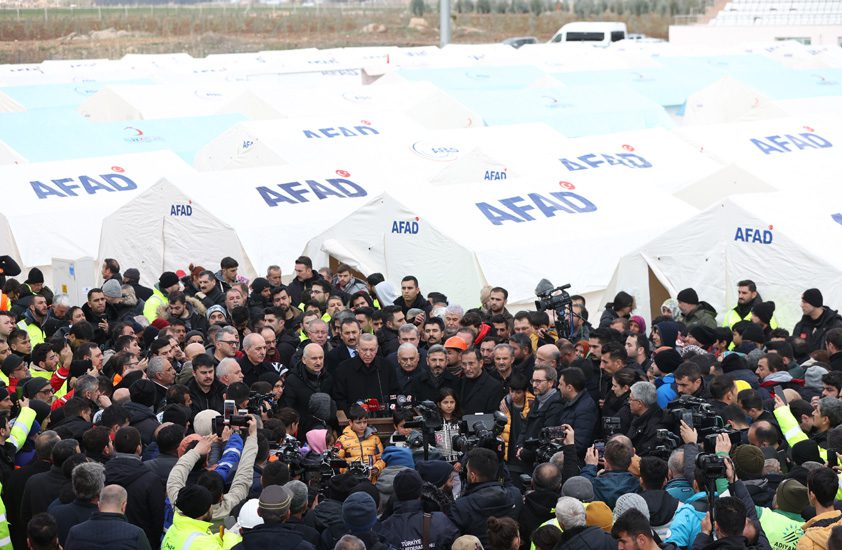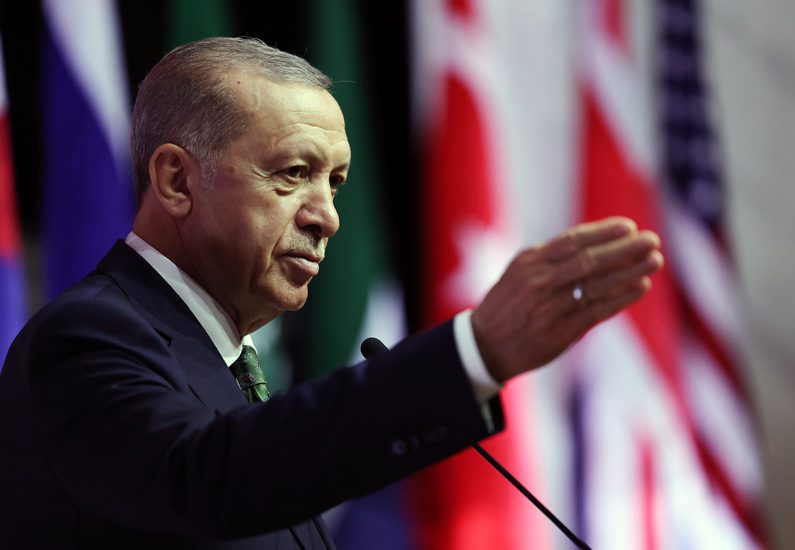In Turkey, millions of people are suffering from a natural disaster without timely government aid. Meanwhile, Erdogan is planning for his next election.
By Ece Temelkuran, The Nation,
On the evening of February 8, two nights after the earthquake that devastated 10 cities in Turkey, four young men with cheap megaphones walked the streets of Istanbul repeating the same cry: “Thousands under the rubble are fighting for their lives tonight. Erdoğan is still trying to cover up his crime. Please tell everyone what you know.”
They were only four of the millions of people who tried to break through the unending oppression and cover-up operation by Turkish President Recep Tayyip Erdoğan’s authoritarian regime in the aftermath of the earthquake. Just a few hours prior, Twitter was throttled by direct order from “the palace,” while many victims were tweeting out their locations from under the destruction. While Turkey was going through the greatest disaster in the history of the republic, Erdoğan was obsessing over silencing the criticism pouring in from social media. What was considered violent oppression of communication on a normal day was now, even for Turkish people accustomed to Erdoğan’s ways, not only criminal but also unbelievable.
So, revolting helplessly, the four young men took to the streets, using their voices—their only viable tool—to fight back. Like hundreds of thousands of people, they were outraged by the shamelessness of authorities who couldn’t send help to devastated cities, yet somehow found time to prosecute the Twitter users criticizing the regime’s failure.
“Touché!” read many tweets, primarily from Turkish citizens joining the social media frenzy from outside the country. They were referring to Erdoğan’s fear of losing power and his efforts to preserve his strongman image. Even by Turkish standards, his hostility toward people who don’t support him is flagrant. He’s failed to send aid to cities that didn’t support his platform, blamed NGO workers for stealing his role, and threatened the nation in his first address instead of offering even a few words of compassion.
“For an average human, this kind of evil is incomprehensible, so when we tell the world, they wouldn’t believe [it],” read another tweet. What struck my people most was the significant gap between the selfless solidarity effort encompassing the entire country and the regime’s priority to save face. But this time, after several disasters mishandled by the state that Erdogan single-handedly controls, they knew that the classic cover-up with the propaganda machine wouldn’t suffice. The dunghill was too big—even for a regime that held 96 percent of the media under strict control and prosecuted all its critics. This time, Erdogan’s classic move—bragging ruthlessly about his success after mishandling a situation, comfortably confident that he wouldn’t be challenged—was not going to work. Even the mainstream media, ruled by the regime’s supporters, was fracturing from outrage. The reality was too devastating; journalists’ basic human dignity leaked through the cracks.
“As I entered the city walking at night, I heard many, so many voices coming from under the rubble. No one was there to help, and the city was in absolute darkness. I didn’t know what to do. I just tiptoed, so the victims did not hear my footsteps. So that they wouldn’t ask for help,” said Mehmet Akif Ersoy, a mainstream TV channel reporter. He was trying to stay composed during a broadcast of the disaster, but he couldn’t hide his shame.
Besides the pain, devastation, and rage, shame has been an overwhelming emotion in the aftermath of this earthquake. The list of reasons is long. For one, Hatay, one the cities hit hardest, received no help from state authorities for almost 48 hours after the disaster because the town is one of the opposition’s strongholds. When Japanese rescue workers made it to the site before the state’s own emergency organization did, Turkish citizens were ashamed by the dysfunction of the national aid work. Where was the Disaster and Emergency Management Presidency (AFAD)?
Since the last big earthquake in 1999, Turkish people have been paying an earthquake tax to fund the AFAD, the state’s emergency organization. Yet, five days after the most recent devastation, thousands of people were without blankets, let alone tents. For many, the question of where their money went became apparent. The day after the earthquake, the head of the Religious Directorate, a state body with a budget 14 times larger than AFAD’s, stated that sela—the death prayer—would ring from the mosques. On the second night after the earthquake, this meant that while many were fighting for their lives under the rubble, they had to listen to their own death knell. Many of them died from hypothermia. A woman tweeted from under the rubble: “My baby just froze to death in my arms.”
Millions in Turkey who were okay expressed similar shame—the shame of sleeping, eating, or even being warm in their own homes. Erdoğan threatened those who “politicized” the disaster, which meant that any criticism against him would be deemed “dishonorable; immoral.” Many social media users couldn’t help but draw similarities between him and 1984’s Big Brother.
After Erdoğan’s speech on February 10, four days after the disaster, several citizens were arrested for criticizing him on social media, while many towns and villages were still waiting for rescue teams. The head of Babala, one of the biggest and most active NGOs, was called in for interrogation while he was on the ground organizing aid work.
Mehmet Akif Ersoy, the same TV journalist who suffered the shame of helplessness, this time was live on air: “I am ashamed to say this, but I heard that the state’s rescue teams are arriving at the last minute and shoving civilian teams aside so they themselves can put victims in front of the cameras.” And then there’s the shame of an elderly man, who cried upon revealing the food he had to steal from a wrecked supermarket because aid didn’t reach his town in time. Foreign rescue teams were similarly ashamed when they left the country in protest because Erdoğan cleaned debris haphazardly. As they gave interviews to international media, reporting that “there are still people under the rubble, and we don’t want to be part of this crime,” Erdogan was making an election promise: “We’ll build everything anew in one year. Give me one year.”





